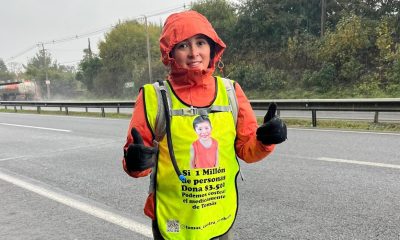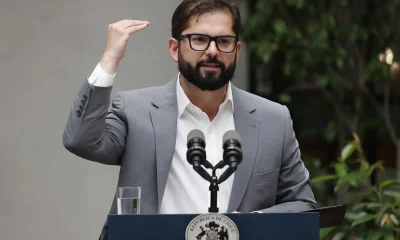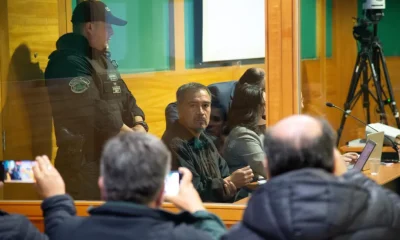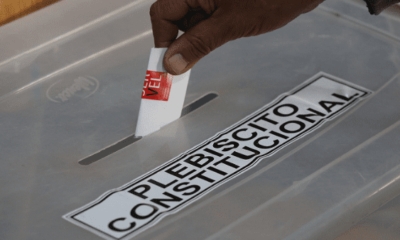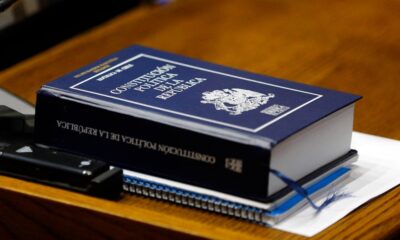International
Chilean mother travels 1,300 kilometers on foot to try to save her son with dystrophy

In the city of Ancud, one of the most important of the Chiloe archipelago, in the south of Chile, there is no hospital, so if one of its about 165,000 inhabitants gets sick, he must take the ferry and travel about 50 kilometers to reach the neighboring city of Puerto Montt, the nearest place.
Camila Gómez, a young mother, decided to take a trip but this time to walk to the Palacio de la Moneda, in Santiago de Chile, more than 1,300 kilometers from her home, to raise funds and make visible the drama of her son Tomás, who suffers from Duchenne muscular dystrophy, one of the so-called “rare diseases”, which almost no one worries and no one finances.
Its main objective is to help collect the nearly four million dollars that costs a vital treatment that does not exist in Chile – it must be imported from the United States – and that would help stop the progression of the child’s ailment, barely five years old.
“Tomás has Duchenne muscular dystrophy in a neuromuscular degenerative disease that gradually weakens the muscles, the respiratory system and the heart, which leads to premature death,” he explains in one of the highs of his journey.
“In Chile there is no type of treatment for this disease, but in the United States there are several treatment options, there are three and here they told me that it was not possible to cover a medicine that is abroad. And it motivated me to do this walk, this physical effort,” he adds.
Gómez regrets that no one, neither the precarious public service nor the greedy private insurance, has offered him an exit in the country, although his son “does have options abroad.
“That’s why we decided to walk, to make the disease visible and take it very particularly to collect the 3.9 million dollars that the drug that is administered for the only time in a lifetime costs. So far (its administration) is approved until the age of four and five. Tomás is five and a half years old. So we are against time,” she urges in anguish.
Even so, hope has not been erased from his face and sometimes, especially when asked about solidarity, he outlines a smile of love and trust.
“We are all aware of the great health deficit, that Chile is a country very backward in health, unlike other more developed countries and we are all aware of that. So people have empathized, supported and contributed to the campaign,” he says.
Along with this mother, who left Ancud on April 28, her husband and father of Tomás, Alex Ross, a friend Álvaro Neira and Marco Reyes, president of the Duchenne Families corporation in Chile, who has two teenage children with the same disease and who proposed the Ross Gómez family to the odyssey.
“I am the logistical support for Camila and Marco who have been walking from Chiloé. I assist them on the way, usually with a change of clothes, food, food, I manage the lodging,” explains Alex.
“(Camila) Walk through Tomás, because we are against time, but he also does it so that no mom has to do it,” he says.
Camila’s third objective is to be able to speak in person with the President of the Republic, Gabriel Boric, to urge him to promote a bill to Congress that allows improving the coverage of rare diseases in the country, and medical assistance in rural areas, abandoned by the state in a country where the privatization of health care prevails.
Neira joined the walk because he was moved by Tomás’ suffering but also because he is worried that “in Chile we do not have the means, a clinic where we can have these medicines, that we have to go to this.”
Tomás was diagnosed in March 2023 with Duchenne’s syndrome, the most common but also most severe form of this type of muscular dystrophy that is triggered by a defective gene that affects dystrophin, a protein that helps keep the body’s cells intact.
It causes problems when walking and running, fatigue, learning difficulties and heart and respiratory deficiencies, and those who suffer from it usually have a life expectancy of between 20 or 30 years in difficult conditions.
With more than 700 kilometers of love in her terrified legs, this mother hopes to arrive in the Chilean capital at the end of this month of May from Chiloe, where there is a movement so that the spending on a bridge that they believe is unnecessary, is dedicated to the construction of a perentory hospital
International
Football Fan Killed in Clashes After Colombian League Match

Fans of Cúcuta Deportivo and their traditional rivals Atlético Bucaramanga clashed outside the stadium following their local league match on Tuesday, leaving one supporter dead and several others injured.
The deceased fan was stabbed, according to a senior police official in Cúcuta who confirmed the cause of death in a video statement. Local media reported that the victim was a supporter of the visiting team, Atlético Bucaramanga.
The match ended in a 2-2 draw. Authorities had banned the entry of Atlético Bucaramanga’s organized supporters into the stadium in an effort to prevent disturbances.
Despite the restrictions, violence broke out in the surrounding areas after the game. Among the injured were three police officers, an institutional source told AFP.
The incident adds to a series of recent violent episodes linked to Colombian football. The most recent occurred in December, when supporters of Atlético Nacional and Independiente Medellín clashed in the stands and on the pitch, leaving 59 people injured.
International
Missing Spanish Sailor Rescued After 11 Days Adrift in Mediterranean

The man had departed from the port of Gandía, on Spain’s eastern coast, with the intention of reaching the southern Spanish town of Guardamar del Segura, a journey of about 150 kilometers, a spokesperson for Spain’s maritime rescue service told AFP.
Search boats and aircraft were deployed on January 17, but the operation was called off on January 22 after efforts proved unsuccessful. Alerts were then issued to vessels navigating the area in case they spotted any signs of the missing sailor.
As hopes were fading, a surveillance aircraft from the European Union’s border agency Frontex spotted the sailboat on Tuesday, along with a person signaling for help, approximately 53 nautical miles northeast of Bejaia, Algeria.
A nearby vessel, the Singapore-flagged bulk carrier Thor Confidence, carried out the rescue and is expected to bring the man to an end to his ordeal when it arrives on Thursday in the southern Spanish port city of Algeciras.
Maritime rescue services shared images on social media showing a small white sailboat drifting at sea and secured alongside the much larger ship.
It remains unclear how the sailboat ended up hundreds of kilometers off its intended route or how the man managed to survive for so long alone in open waters.
International
Rubio Says U.S. Could Participate in Follow-Up Russia-Ukraine Talks

The United States could join a new round of talks this week aimed at ending Russia’s invasion of Ukraine, Secretary of State Marco Rubio said on Tuesday.
Teams from Kyiv and Moscow met last Friday and Saturday in Abu Dhabi in their first publicly acknowledged direct negotiations to discuss the peace initiative promoted by former U.S. President Donald Trump.
“They are going to hold follow-up talks again this week,” Rubio told the Senate Foreign Relations Committee. “There could be U.S. participation.”
However, Rubio suggested that Washington’s role may be more limited than during last week’s discussions, which included Steve Witkoff, the president’s special envoy, and Jared Kushner, Trump’s son-in-law.
The secretary of state indicated that progress may have already been made on security guarantees for Ukraine, one of Kyiv’s key demands in any agreement with Moscow after nearly four years of Russian invasion.
“There is one remaining issue that everyone is familiar with, and that is the territorial claim over Donetsk,” Rubio said, referring to the eastern Ukrainian region that Russia wants Ukraine to cede.
“I know that active efforts are underway to see whether the positions of both sides on this issue can be reconciled. It remains a bridge we have not yet crossed,” he added during the hearing.
Rubio acknowledged that the territorial question would be particularly difficult for Ukraine to resolve.
-

 Central America3 days ago
Central America3 days agoGuatemala seizes over a ton of cocaine hidden in flour at Pacific port
-

 International4 days ago
International4 days agoDelcy Rodríguez seeks political agreements after Maduro’s ouster
-

 International3 days ago
International3 days agoHistoric snowstorm paralyzes Toronto after 60 centimeters of snow
-

 International3 days ago
International3 days agoSpain’s irregular migrant population rises to 840,000, study finds
-

 International4 days ago
International4 days agoFederal immigration agents kill man in Minneapolis, sparking protests and outrage
-

 Central America2 days ago
Central America2 days agoGuatemala Police Arrest Prison Guard Caught in the Act of Extortion
-

 Central America2 days ago
Central America2 days agoHonduras swears in conservative president Asfura after disputed election
-

 Central America2 days ago
Central America2 days agoBukele leads public trust rankings as UCA survey highlights gains in security
-

 International15 hours ago
International15 hours agoFootball Fan Killed in Clashes After Colombian League Match
-

 International2 days ago
International2 days agoWinter Storm Fern Leaves 30 Dead and Over One Million Without Power Across the U.S.
-

 Sin categoría2 days ago
Sin categoría2 days agoEight Killed in Series of Armed Attacks in Ecuador’s Manabí Province
-

 International2 days ago
International2 days agoDoomsday clock moves to 85 seconds before midnight amid rising global risks
-

 International3 days ago
International3 days agoRights group says nearly 6,000 killed in Iran protest crackdown
-

 International2 days ago
International2 days agoSpain approves plan to regularize up to 500,000 migrants in Historic Shift
-

 International15 hours ago
International15 hours agoRubio Says U.S. Could Participate in Follow-Up Russia-Ukraine Talks
-

 International3 days ago
International3 days agoVenezuela frees at least 80 political prisoners, NGO says
-

 Sin categoría2 days ago
Sin categoría2 days agoEl Salvador Launches Fourth Year of Ocean Mission to Protect Marine Ecosystems
-

 International15 hours ago
International15 hours agoMissing Spanish Sailor Rescued After 11 Days Adrift in Mediterranean
-

 International3 days ago
International3 days agoEU launches new probe into X over AI-generated fake nude images
-

 Central America15 hours ago
Central America15 hours agoGuatemala President Says Starlink Terminal Found Inside Prison
-

 International3 days ago
International3 days agoFrance debates ban on social media for children under 15
-

 International3 days ago
International3 days agoSevere winter storm grips U.S., leaves multiple dead as extreme cold persists



























